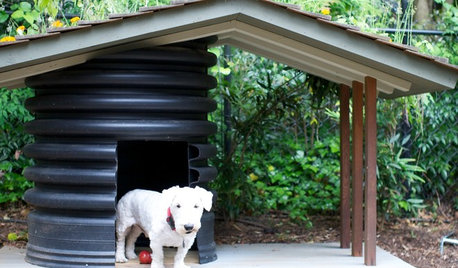Not particularly good news
Kimmsr
9 years ago
Related Stories

ARTShow News: Rare Quilts Get Museum Time
See 6 intricate designs from a California exhibition and get tips for building your own quilt collection
Full Story
Special Report: Interior Design News From Cologne
Take a Photo Tour of the Latest Furniture Innovations Headed Our Way
Full Story
DECORATING GUIDESSpecial Report: Design News from Toronto
See playful color, fur pendants, ornate chandeliers, dark wood and more at the 2011 Toronto Interior Design Show
Full Story
KITCHEN DESIGNSpecial Report: Kitchen News from Cologne
Blended Kitchen-Living Rooms, Super-Skinny Counters and Hidden Appliances Are Headed This Way
Full Story
REMODELING GUIDESHouzz News: Remodeling Heats Up
With the U.S. economy showing signs of recovery, homeowners invest in quality, livability and "a place to make their own"
Full Story
Minimalist Home in Spain Wins World Architecture News Award
An unadorned house in an ancient Catalonian district catches the attention of the jury panel for its minimalist interior design
Full Story
PETSHow to Help Your Dog Be a Good Neighbor
Good fences certainly help, but be sure to introduce your pup to the neighbors and check in from time to time
Full Story
GARDENING FOR BUTTERFLIESGardening for the Bees, and Why It’s a Good Thing
When you discover how hard bees work for our food supply, you may never garden without them in mind again
Full Story
MOST POPULAR5 Remodels That Make Good Resale Value Sense — and 5 That Don’t
Find out which projects offer the best return on your investment dollars
Full Story
ECLECTIC HOMESHouzz Tour: Good Vibes for a Hollywood Couple in Laurel Canyon
Actor Ian Harding and artist Sophia Hart’s personalities shine in a house nestled in the trees
Full StoryMore Discussions








Hermitian
renais1
Related Professionals
Reading Landscape Architects & Landscape Designers · Mount Wilson Landscape Architects & Landscape Designers · Tempe Landscape Contractors · Maple Valley Landscape Contractors · Avocado Heights Landscape Contractors · Dallas Landscape Contractors · Kahului Landscape Contractors · North Haven Landscape Contractors · North Potomac Landscape Contractors · Oxnard Landscape Contractors · Ringwood Landscape Contractors · Santa Ana Landscape Contractors · Wayland Landscape Contractors · Maple Grove Decks, Patios & Outdoor Enclosures · Schaumburg Decks, Patios & Outdoor EnclosuresMichael
Hermitian
nc_crn
Michael
KimmsrOriginal Author
renais1
Hermitian
nc_crn
pnbrown
nc_crn
KimmsrOriginal Author
pnbrown